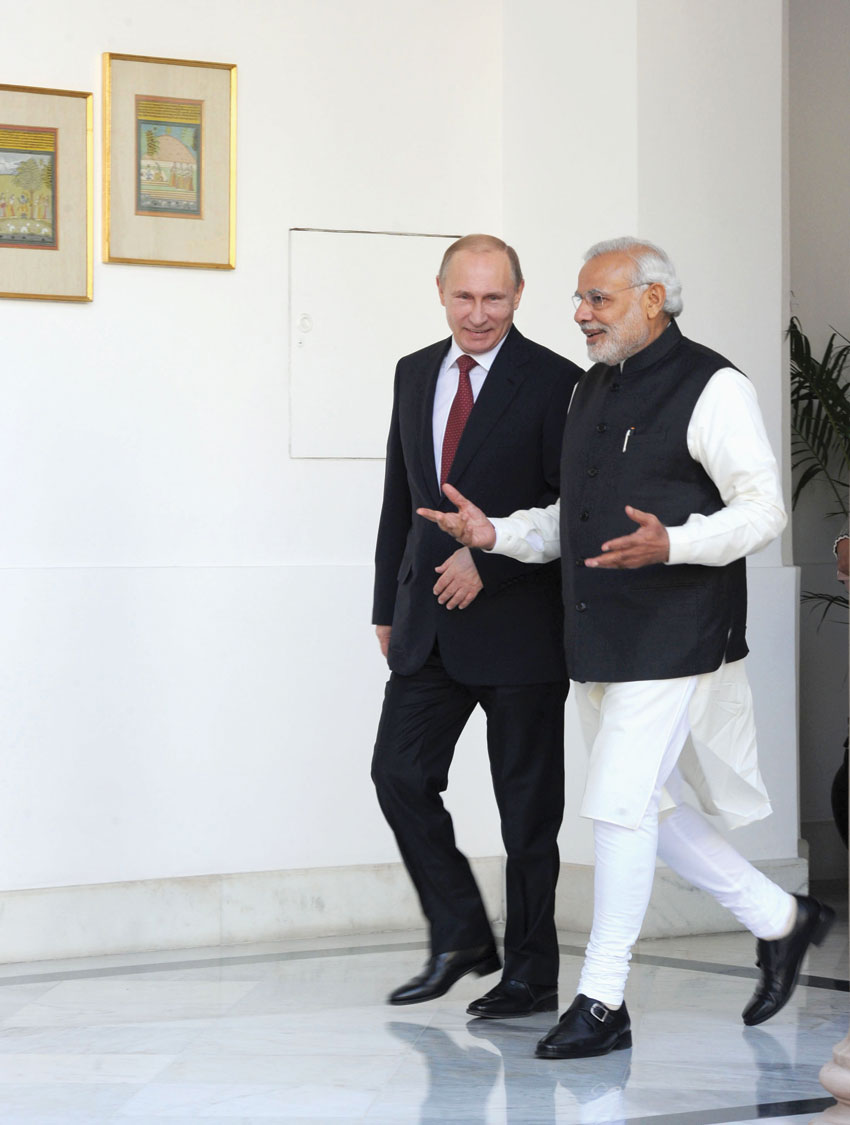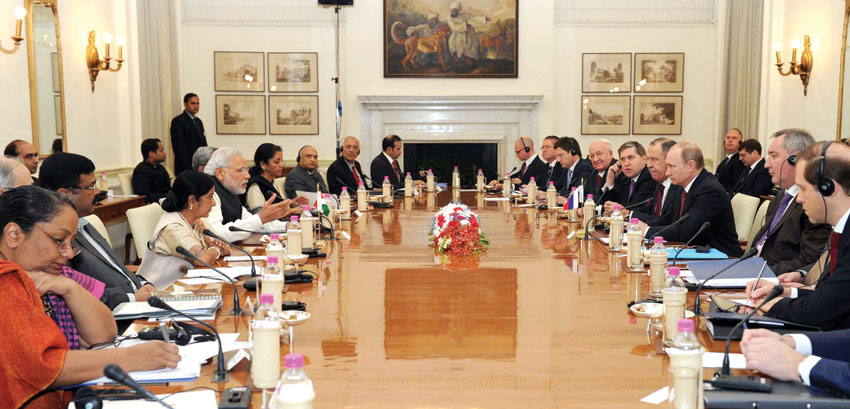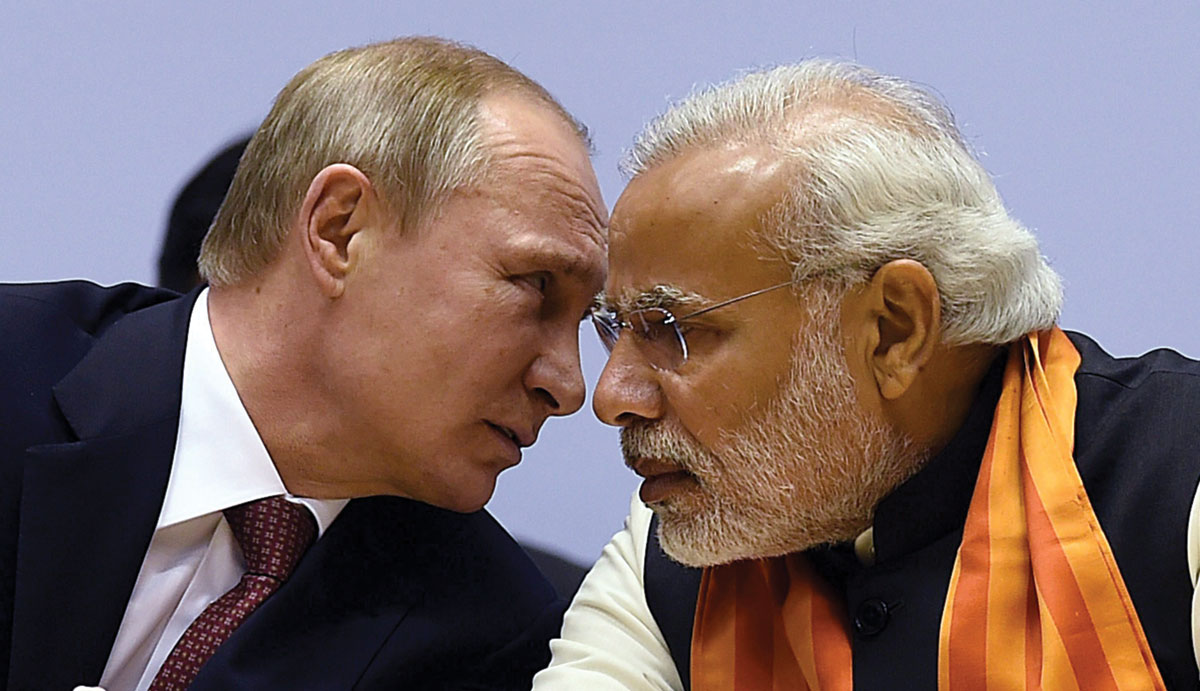PUTIN ESSAYS INVIGORATING TIES
Prime Minister Narendra Modi and Russian President Vladimir Putin during the World Diamond Conference in New Delhi, in December last year. (Shahbaz Khan | PTI)
[divider type=”thin”]
The India-Russia “strategic partnership” received a shot in the arm in a brief time of about twenty-two hours of the Russian President Vladimir Putin’s visit to New Delhi, Dec. 10-11, last year. A slew of deals were inked in the short visit that ranged from defense, nuclear energy, oil and gas, aeronautics, and diamonds. Besides the agreements, India and Russia also signed a Joint Statement marking a reaffirmation of old bonds that have for decades underlined the strong bilateral relationship, writes Priyanka Bhardwaj.
[divider type=”thin”]
The India-Russia “strategic partnership” received a shot in the arm in a brief time of about twenty-two hours of the Russian President Vladimir Putin’s visit to New Delhi, Dec. 10, last year. Assertive steps towards further deepening of ties came with the conclusion of an impressive slew of 20 agreements worth $100 billion that revolve around the areas of defense, nuclear energy, oil, gas, fertilizers, space and diamonds.
Primary among these long term deals are; Russian state-owned Rosatom promising to set up 12 nuclear reactors for India; Rosneft, the Russian energy giant, undertaking a decade’s supply of crude to private Indian firm, Essar Oil; Russia’s VTB Bank Management Board inking a memorandum of understanding with the Essar Group for a $1 billion facility for consolidation of certain assets in Essar’s investment portfolio and strengthening of their capital structure; about $3 billion worth of advanced helicopters for New Delhi; an offer to support India’s civil aviation industry, specifically Sukhoi Superjet-100 and MC-21 airplanes; rough Russian diamonds of about $700 million to be shipped to a dozen Indian companies in the next 3 years; and, Russian Direct Investment Fund (RDIF) and India’s IDFC deciding to invest up to $500 million each in India’s infrastructure projects for ports, toll roads and hydropower.

This majorly translates into India obtaining the wherewithal to manufacture advanced helicopters and nuclear reactors, and collaborate on hydrocarbon front.
Russia also coaxed India’s new central dispensation to initiate a Delhi-Mumbai industrial corridor and set up the world’s largest butyl rubber producing plant in Gujarat.
Putin clearly insisted to intensify defense cooperation with India and maintain Russia’s lead as India’s largest defense supplier.
As per Stockholm International Peace Resource Center, till about 2013, Russian arms made for 75 percent of India’s imports and the United States made arms for only 7 percent.
Besides the agreements India and Russia also signed a Joint Statement marking a reaffirmation of old bonds that have for decades underlined the strong bilateral relationship with the exception of the Boris Yeltsin era, in the aftermath of the breakup of the former Soviet Union into several states.
Speaking at the conclusion of the latest historic summit, Indian Prime Minister Narendra Modi said that both the countries have moved up several notches in their relations.
Trumpeting this strengthening of synergies Modi declared, “The strategic partnership is incomparable in content. Russia has given its steadfast support to India in difficult times. Even if India’s options have increased, Russia remains our most important defense partner.”
Sharing Modi’s enthusiasm Putin reiterated along similar lines that the “special privileged partnership” between the two nations would “continue to develop dynamically” and that, “We (Russians) are content with how this visit is being conducted and also with the outcome of the visit … India and Russia encourage use of nuclear energy for peaceful purposes. We are working on 20 nuclear power plant units for India. We had constructive talks on a whole gamut of issues.”
The current episode of engagement can be described as an achievement of sorts as it comes in the backdrop of difficult times; declining prices of oil, and the West frowning down heavily upon India’s cozy engagement with Russia that stands accused of annexing Crimea and of possible involvement in the gunning down of Malaysian passenger airplanes in Ukraine.

Last month, in November, during the G-20 summit in Australia, the West had announced economic sanctions against Moscow, which had forced Putin to leave the country much before the summit reached its final leg.
Now that Putin’s India delegation also included Crimea’s Russia-supported leader, all eyes were on Putin’s meet with Modi.
And as expected, unhappy rumbles reverberated from the U.S. corridors of power and objections were raised to the very evident Indo-Russo affability.
It is a known fact that India has always found an ally in Russia ever since its struggle for Independence, later during its wars with China and Pakistan, and in matters of seeking induction into major international forums as also its ongoing ambition to be part of the Security Council of the United Nations.
On its part Russia too has not many time-tested dependable supporters.
Japan has never been much of a friend in times of crisis for Russia.
When it comes to China, Russia has recently found a huge energy market in China and thus concluded major treaties for pipelines and held discussions about creating an alternative to SWIFT, messaging service used by banks.
Yet, to quell any Chinese intentions of exploiting its weaknesses and also to achieve some balance in the rising Russian dependence on China, Putin’s attempt to reignite closeness with India is a way forward in Russia’s interests.
And like a true friend India refrained from criticizing Russia over Ukraine, did not add to the ranks of those in favor of embargo against it and maintained neutrality in its observations over contentious issues.
But the Modi-led dispensation in New Delhi that has been more-business oriented and in the past few months, the South Asian nation basked in the attention of different economic powers such as China, Japan, Australia and the USA, was put through much dismay when Moscow sent a Defense Ministry delegation to Pakistan.
Also Russia bringing onto India’s table a chance to not just receive but co-develop sensitive technological products and perhaps be a future potential exporter of the same, all of which would eventually up its stature and capacities vis-a-vis China and in Asia is for sure a golden opportunity for India to grab with both hands.
Even as most analysts may term agreements as largely of consensus building and MoU in nature, given the assertiveness of the two leaders, Putin and Modi, and majority that they enjoy in their respective countries it may be safely forecasted Indo-Russia relations are at a zenith and most likely to sustain this momentum for quite some time.


